|
|
|
Sort Order |
|
|
|
Items / Page
|
|
|
|
|
|
|
| Srl | Item |
| 1 |
ID:
165861


|
|
|
|
|
| Summary/Abstract |
We explore what can be learned from authoritarian backsliding in middle income countries about the threats to American democracy posed by the election of Donald Trump. We develop some causal hunches and an empirical baseline by considering the rise of elected autocrats in Venezuela, Turkey, and Hungary. Although American political institutions may forestall a reversion to electoral autocracy, we see some striking parallels in terms of democratic dysfunction, polarization, the nature of autocratic appeals, and the processes through which autocratic incumbents sought to exploit elected office. These processes could generate a diminished democratic system in which electoral competition survives, but within a political space that is narrowed by weakened horizontal checks on executive power and rule of law.
|
|
|
|
|
|
|
|
|
|
|
|
|
|
|
|
| 2 |
ID:
117474
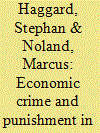

|
|
|
|
|
| Publication |
2012.
|
| Summary/Abstract |
STEPHAN HAGGARD and MARCUS NOLAND describe North Korea's prison system. The system includes not only the infamous penal camps for political prisoners but detention facilities that permit short-run incarceration for economic crimes. They find that those with greater involvement in the market are more likely to face incarceration in such facilities and that the criminalization of economic activity allows the state to extract bribes.
|
|
|
|
|
|
|
|
|
|
|
|
|
|
|
|
| 3 |
ID:
121127
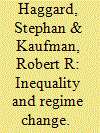

|
|
|
|
|
| Publication |
2012.
|
| Summary/Abstract |
Recent work by Carles Boix and Daron Acemoglu and James Robinson has focused on the role of inequality and distributive conflict in transitions to and from democratic rule. We assess these claims through causal process observation, using an original qualitative dataset on democratic transitions and reversions during the "third wave" from 1980 to 2000. We show that distributive conflict, a key causal mechanism in these theories, is present in just over half of all transition cases. Against theoretical expectations, a substantial number of these transitions occur in countries with high levels of inequality. Less than a third of all reversions are driven by distributive conflicts between elites and masses. We suggest a variety of alternative causal pathways to both transitions and reversions.
|
|
|
|
|
|
|
|
|
|
|
|
|
|
|
|
| 4 |
ID:
081865
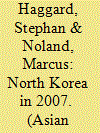

|
|
|
|
|
| Publication |
2008.
|
| Summary/Abstract |
The year 2007 witnessed a gradual rapprochement between North Korea and the world, reflecting changes both in the country's external environment and domestic political economy. Key markers were the resumption of the Six-Party Talks and the second North-South summit. Whether these developments will endure depends largely on North Korean intentions
|
|
|
|
|
|
|
|
|
|
|
|
|
|
|
|
| 5 |
ID:
086683
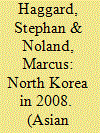

|
|
|
|
|
| Publication |
2009.
|
| Summary/Abstract |
In 2008, North-South relations worsened, food shortages re-emerged, and the Six Party process yielded an interim agreement. The U.S. dropped North Korea from the terrorism list but nuclear verification issues remained contentious. Kim Jong-il reportedly suffered a stroke in August, casting uncertainty over all aspects of politics and policy.
|
|
|
|
|
|
|
|
|
|
|
|
|
|
|
|
| 6 |
ID:
182629
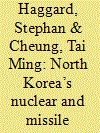

|
|
|
|
|
| Summary/Abstract |
North Korea’s strategic weapons innovation system is exemplary of an authoritarian mobilization model. The top leadership prioritizes the program and mobilizes the country’s science, technology, and heavy industrial resources around key programs. Key to success are investments in a defense industrial infrastructure that runs from basic research and development to applied R&D, product development, and linked production capability. Although foreign borrowing is important, the country’s nuclear and missile programs would not have gelled in the absence of complementary domestic investments.
|
|
|
|
|
|
|
|
|
|
|
|
|
|
|
|
| 7 |
ID:
081498
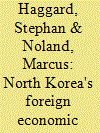

|
|
|
|
|
| Publication |
2008.
|
| Summary/Abstract |
Many debates about engagement with North Korea hinge on the precise nature of North Korea's foreign economic relations: whether trade and investment are on commercial or non-commercial terms; the extent of illicit activities, and the changing geographic patterns of North Korea's trade. This article provides an effort to reconstruct North Korea's foreign economic relations, subordinating our estimates to the discipline of the balance of payments accounting framework. Among the most salient findings for the debate about engagement and sanctions is that North Korea's trade and investment have continued to increase despite the onset of the nuclear crisis and a decline in illicit activities. This growth has occurred in part because of the growing weight of China and South Korea in trade, aid, and investment. We also find that economic relations between North and South Korea have a substantially greater non-commercial component than those occurring across the China-North Korea border
|
|
|
|
|
|
|
|
|
|
|
|
|
|
|
|
| 8 |
ID:
053720


|
|
|
| 9 |
ID:
133771
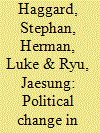

|
|
|
|
|
| Publication |
2014.
|
| Summary/Abstract |
During the succession from Kim Jong Il to Kim Jong Un, North Korea witnessed a revival of party institutions. However, the most distinctive feature of the transition was a succession of purges that replaced powerful figures from the Kim Jong Il era with new loyalists. The system remains personalist, but with strong reliance on the military and security apparatus.
|
|
|
|
|
|
|
|
|
|
|
|
|
|
|
|
| 10 |
ID:
133655
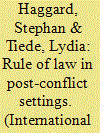

|
|
|
|
|
| Publication |
2014.
|
| Summary/Abstract |
This paper analyzes whether and to what extent countries reconstitute the rule of law following civil conflict. Drawing on an original data set of 47 cases in which conflict ended between 1970 and 1999, we find that the cessation of conflict has at best a modest effect on the rule of law. On average, countries revert to the pre-conflict rule-of-law status quo ante. In simple models, rule of law prior to the onset of conflict is the best indicator of post-conflict performance. Analysis of individual cases using structural break analysis shows that the cessation of conflict is not typically associated with an inflection in the rule of law; improvements are modest, take a long time, and fall far short of plausible thresholds for robust rule of law.
|
|
|
|
|
|
|
|
|
|
|
|
|
|
|
|
| 11 |
ID:
097229
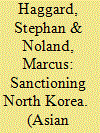

|
|
|
| 12 |
ID:
088447


|
|
|
|
|
| Publication |
2009.
|
| Summary/Abstract |
Northeast Asia is notable for the relative absence of regional institutions. The Six Party Talks could constitute an embryonic starting point for the development of such institutions. The path toward greater institutionalization is likely to begin in a modest fashion. Functional working groups on topics such as the environment, maritime transport, technical barriers to trade, road and rail links, and energy could provide the locus for integrating North Korea into the broader regional and global economies. Foreign ministries will inevitably take the lead in developing the Northeast Asia Peace and Security Mechanism (NEAPSM), but meaningful economic achievements will require the involvement of other ministries. North Korea has proved problematic in this regard thus far. Moreover, given the importance of private-sector involvement in achieving sustainable economic development in North Korea, modalities will have to be developed to integrate private-sector actors when possible. The governments of the region, and particularly China and South Korea, may continue support on a bilateral basis as a hedge against North Korea's collapse or as inducements in the context of the nuclear talks. But the development of more permanent multilateral structures is unlikely until the nuclear issue is resolved.
|
|
|
|
|
|
|
|
|
|
|
|
|
|
|
|
|
|
|
|
|